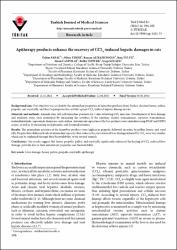Apitherapy products enhance the recovery of CCL4-induced hepatic damages in rats

View/
Access
info:eu-repo/semantics/openAccessDate
2016Author
Saral, ÖzlemYıldız, Oktay
Aliyazıcıoğlu, Rezzan
Yuluğ, Esin
Canpolat, Sinan
Öztürk, Ferhat
Kolaylı, Sevgi
Metadata
Show full item recordCitation
Saral, Ö., Yildiz, O., Aliyazicioğlu, R., Yuluğ, E., Canpolat, S., Öztürk, F., & Kolayli, S. (2016). Apitherapy products enhance the recovery of CCL4-induced hepatic damages in rats. Turkish journal of medical sciences, 46(1), 194–202. https://doi.org/10.3906/sag-1411-35Abstract
Background/aim: Our objective was to identify the antioxidant properties of honeybee products from Turkey, chestnut honey, pollen, propolis, and royal jelly, and their hepatoprotective activity against CCl4 -induced hepatic damage in rats. Materials and methods: Animals were fed with honeybee products for 7 days following CCl4 injection. Development of liver damage and oxidative stress were monitored by measuring the activities of the enzymes alanine transaminase, aspartate transaminase, malondialdehyde, superoxide dismutase, and catalase. Antioxidant capacities of the bee products were identified using FRAP and DPPH assays, as well as by measuring total phenolic and flavonoid contents. Results: The antioxidant activities of the honeybee products were highest in propolis, followed, in order, by pollen, honey, and royal jelly. Despite their different levels of antioxidant capacity, their roles in the prevention of liver damage induced by CCl4 were very similar, which can be explained through their bioavailability to the treated animals. Conclusions: Our results suggest that honey, propolis, pollen, and royal jelly significantly enhanced the healing of CCl4 -induced liver damage, partially due to their antioxidant properties and bioavailability.

















